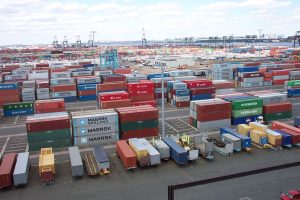Effective debt collection is crucial for improving cash flow in container shipping. This article explores the challenges in debt collection, the implementation of technology solutions, and best practices for successful debt recovery in the industry.
Key Takeaways
- Understanding the legal framework is essential for successful debt collection in container shipping.
- Effective communication strategies can help in resolving debt collection issues efficiently.
- Industry-specific challenges require tailored debt collection approaches in container shipping.
- Automation tools can streamline the debt collection process and improve efficiency.
- Timely follow-ups and documentation are key to successful debt recovery in container shipping.
Challenges in Debt Collection for Container Shipping
Legal Framework
Navigating the complex legal framework of international waters is a daunting task. We must understand the diverse regulations that govern debt collection in different jurisdictions. Uniformity is scarce, and each country’s laws can significantly impact our recovery strategies.
- Familiarize with international maritime law
- Comprehend local legal nuances
- Engage with specialized legal counsel
Ensuring compliance with legal standards is not just about following rules; it’s about protecting our bottom line.
Failure to adhere to legal requirements can lead to costly disputes and hinder our cash flow. It’s imperative we stay informed and agile, adapting our approaches to the legal landscapes we operate within.
Communication Strategies
In the realm of container shipping, we understand that clear and effective communication is the linchpin of successful debt collection. We prioritize transparency with our clients to foster trust and ensure mutual understanding.
Engagement is key. We employ a range of communication channels to reach out to debtors, ensuring that messages are not only sent but also received and acknowledged. Here’s a snapshot of our approach:
- Personalized emails tailored to the debtor’s history
- Direct phone calls for immediate dialogue
- SMS reminders for quick notifications
We believe in the power of proactive communication. It’s not just about sending reminders; it’s about building a relationship that encourages timely payments.
By maintaining consistent communication, we not only keep the lines open but also minimize the risk of disputes. This strategy is integral to our overall approach to improving cash flow through effective debt collection.
Industry Specific Challenges
In the container shipping industry, we face unique hurdles when it comes to debt collection. Navigating through a maze of international regulations is a daunting task, often compounded by the diversity of legal systems we encounter. We must also consider the high-value transactions typical in our industry, which necessitate a meticulous approach to debt recovery.
- Understanding the complexities of maritime liens and ship arrests
- Dealing with multi-jurisdictional disputes and enforcement
- Managing the risks associated with international trade and currency fluctuations
Our success hinges on our ability to adapt to these industry-specific challenges, ensuring that our cash flow remains robust in the face of adversity.
For those of us in the container shipping sector, it’s clear that traditional methods of debt collection may not suffice. This is where third-party solutions like DCI come into play, offering specialized debt recovery services tailored for transportation and logistics businesses. The benefits of such services often outweigh the costs and complexities of litigation. For more information, visit www.debtcollectorsinternational.com or call 855-930-4343.
Implementing Technology Solutions for Efficient Debt Collection
Automation Tools
In the realm of container shipping, we’re harnessing the power of automation tools to revolutionize debt collection. These tools streamline processes, reduce human error, and ensure consistent follow-up.
- Automated invoicing and payment reminders free up valuable time.
- Smart algorithms prioritize high-risk accounts, optimizing our efforts.
- Electronic document management keeps records accessible and organized.
By integrating automation, we’re not just chasing payments—we’re building a smarter, more proactive debt collection system.
Embracing automation translates to faster payment cycles and a healthier cash flow.
The impact is clear: businesses that adopt these tools see a measurable uptick in efficiency and success rates. It’s not just about technology; it’s about transforming our approach to debt recovery.
Data Analytics
We harness the power of data analytics to transform the debt collection process in container shipping. By analyzing payment patterns and customer behavior, we identify trends that predict delays or defaults. Bold decisions are made based on actionable insights, optimizing our approach to debt recovery.
- Identify high-risk accounts early
- Tailor collection strategies to customer segments
- Monitor real-time payment activities
With precise analytics, we streamline operations, reduce bad debt, and improve cash flow. Our focus is on predictive analysis, ensuring we’re always a step ahead. Data-driven strategies are not just reactive; they’re proactive, setting the stage for a healthier balance sheet.
Integration with Payment Systems
We’re streamlining our cash flow by harnessing the power of integrated payment systems. Seamless transactions are no longer a luxury; they’re a necessity for staying afloat in the competitive container shipping industry. By embedding payment solutions directly into our invoicing and accounting platforms, we’re reducing friction and enhancing the customer payment experience.
Efficiency is the name of the game. With real-time payment tracking, we’re able to monitor incoming funds and quickly identify overdue accounts. This proactive approach allows us to address potential issues before they escalate into significant debts.
- Immediate payment confirmation
- Automated payment reminders
- Easy reconciliation of accounts
By ensuring that every dollar is accounted for, we’re not just improving our cash flow; we’re building a foundation of financial stability that can weather the storms of cross-border transportation services and supply chain disruptions.
Our commitment to integrating advanced payment systems is a testament to our dedication to effective debt collection. We’re not just reacting to late payments; we’re preventing them.
Best Practices for Successful Debt Recovery in Container Shipping
Timely Follow-ups
We understand the critical nature of timely follow-ups in the debt collection process. It’s not just about persistence; it’s about strategic timing. Our approach is to strike the right balance, ensuring that we’re assertive without being overbearing.
- Initial contact within 48 hours of a missed payment
- Weekly check-ins for the first month
- Bi-weekly touchpoints if the debt extends beyond 30 days
By maintaining a consistent follow-up schedule, we keep the lines of communication open and the debt at the forefront of the debtor’s mind.
The key is to be proactive, not reactive. We leverage reminders and alerts to stay ahead of the schedule, ensuring no opportunity for recovery slips through the cracks. This methodical approach has proven to be effective in safeguarding our cash flow and maintaining healthy client relationships.
Negotiation Techniques
We understand that negotiation is an art, especially when it comes to debt recovery in container shipping. Effective communication is key, and we always aim to strike a balance between firmness and empathy. By doing so, we maintain professional relationships while ensuring our financial objectives are met.
Flexibility can be a powerful tool in our negotiation arsenal. Offering payment plans or considering partial payments can lead to more successful debt recovery outcomes than rigidly sticking to original terms. Here’s a simple list of techniques we employ:
- Establishing clear payment terms from the outset
- Listening actively to debtor concerns
- Proposing mutually beneficial solutions
- Maintaining a professional demeanor throughout
We prioritize understanding the debtor’s situation and tailor our approach accordingly. This personalized strategy often leads to more amicable and effective resolutions.
Remember, securitization of assets in the Transportation and Logistics Industry offers financial flexibility, but caution is advised due to credit risks. Consider debt recovery experts like DCI for efficient debt management.
Documentation and Record-keeping
In our quest to streamline cash flow, we recognize the power of meticulous documentation and record-keeping. Keeping accurate records is not just about compliance; it’s a strategic tool for effective debt recovery. Financial reports such as the Balance Sheet, Income Statement, and Debt Schedule are indispensable in this process. They provide a clear picture of financial health and pinpoint areas requiring attention.
By maintaining comprehensive records, we create a robust foundation for our debt collection efforts.
Our partnership with DCI, a leader in debt recovery services for the Transportation and Logistics Sector, leverages their global reach and advanced techniques. This collaboration ensures that our strategies are not only comprehensive but also at the forefront of industry standards.
To ensure clarity and ease of access, we organize our records in the following manner:
- Client contact information
- Credit agreements
- Payment histories
- Correspondence with clients
This structured approach aids in the swift retrieval of information, making the debt collection process more efficient and less prone to errors.
Frequently Asked Questions
What are the common challenges in debt collection for container shipping?
The common challenges include navigating the legal framework, implementing effective communication strategies, and addressing industry-specific challenges.
How can technology solutions improve debt collection in container shipping?
Technology solutions such as automation tools, data analytics, and integration with payment systems can streamline the debt collection process and enhance efficiency.
What are the best practices for successful debt recovery in container shipping?
Best practices include timely follow-ups with debtors, employing negotiation techniques to reach settlements, and maintaining thorough documentation and record-keeping.
How important is the legal framework in debt collection for container shipping?
The legal framework is crucial as it provides guidelines for debt collection practices, protects the rights of both debtors and creditors, and ensures compliance with regulations.
How can effective communication strategies aid in debt collection for container shipping?
Effective communication strategies help in establishing clear terms with debtors, maintaining transparency throughout the collection process, and facilitating prompt resolution of disputes.
What industry-specific challenges may impact debt collection in container shipping?
Industry-specific challenges such as fluctuating market conditions, complex contractual agreements, and global economic factors can impact debt collection efforts in container shipping.





